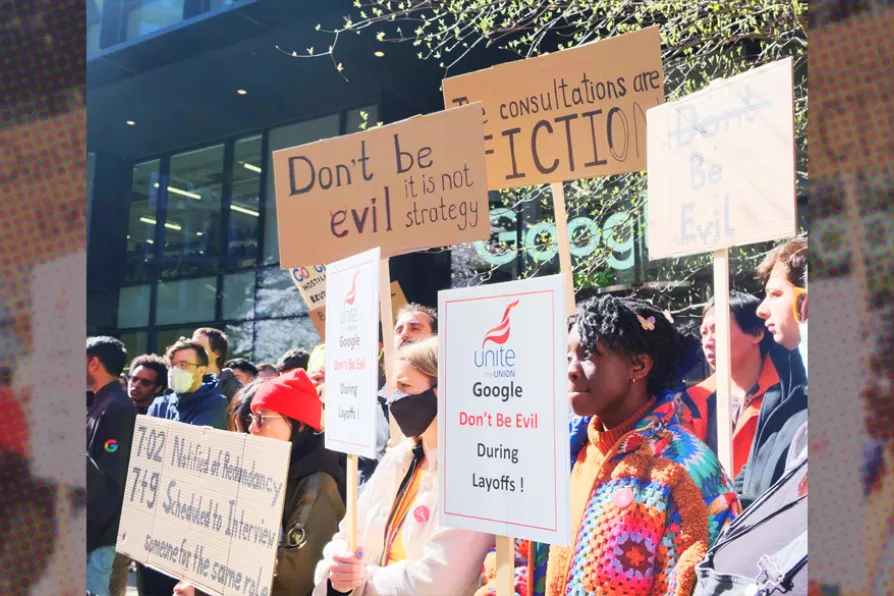The language of humiliation is a step towards a second civil war, argues RAMZY BAROUD

 Unite members at Google stage a demonstration outside the company’s Kings Cross headquarters over the ‘appalling treatment and union busting’ of staff facing redundancies, April 2023
Unite members at Google stage a demonstration outside the company’s Kings Cross headquarters over the ‘appalling treatment and union busting’ of staff facing redundancies, April 2023
THE TUC special taskforce report on an Artificial Intelligence (AI) and Employment Rights Bill is published today, April 18. Comprising of the TUC, the Minderoo Centre for Technology and Democracy at the University of Cambridge, unions academics and employment rights specialists the taskforce was set up to try to secure proper regulation of AI and algorithmic management to halt Britain’s tech sector from becoming the “wild west” of the economy.
The report makes several key recommendations including a legal requirement for employers to consult unions on the use of “high risk” and intrusive forms of AI in the workplace; a legal right for job seekers and workers to have a human review of decisions made by AI systems so they can challenge AI decisions that are unfair and discriminatory; amendments to the Equality Act to guard against discriminatory algorithms; protections against unfair dismissal by AI; a prohibition on some uses of emotion recognition technology and a right to a personalised explanation of high-risk risk decisions made by AI workers in Britain’s media, digital and tech sector, accounting for over two million jobs will be on the AI front line.
One of the key problems is that union membership in the tech sector remains stubbornly low in many countries, with a diverse employment base — from large corporations to small start-ups — many with precarious and third-party employment.
From the 1980s onwards unions tried to recruit new members in tech areas by setting up specialist ‘associations' to attract tech workers or using high profile campaigns imported from USA where “start up unions” such alliance@ibm (which joined the Communication Workers of America) in global companies. What sounded good failed to achieve mass union membership after years of grinding management opposition, and “re-balancing the workforce”.
But maybe things have turned the corner.
In 2023 workers at the Swedish fin-tech company Klarna demanded representation and collective bargaining by joining Unionen. The company told the workforce collective bargaining “did not fit their business model.” The Unionen union organised immediate strike action and 5,000 workers in Stockholm won union recognition and a collective agreement.
In the US workers in the video gaming company Sega of America followed Raven Software, Blizzard Albany, ZeniMax, and game developer Tender Claws in winning union recognition. AEGIS-CWA (Allied Employees Guild Improving SEGA — Communication Workers of America) organised across Sega facilities including workers in marketing, product development and sales to build membership and making it now the largest video game union in the US.
In Romania, Sindicatul IT Timisoara (SITT the Romanian IT Union) now represents 3,000 tech and outsourced workers at Alcatel-Lucent, Wipro, Accenture and Alto and were helped in organising by the European Union federation Uni Europa.
In Britain the CWU, via the United Tech and Allied Workers Union Branch, is organising workers in Apple stores; the white-collar union Prospect has launched a tech sector and Unite’s London Digital and Tech branch has seen a membership boost since 2023.
James Bowen the secretary of the Unite London Digital and Tech branch told me: “The branch had doubled in size over due to organising in ‘big tech’ firms such as Google. We’ve also grown at firms where we were well established, such as Voyix and Atleos thanks to the work of our Representative during pay negotiations. We are recruiting members from a diverse range of companies such as Accenture, the BBC, Cap Gemini and Computacenter.”
The branch organised protests at Google at its Kings Cross HQ in London over redundancies which gained a national profile — and increased union membership. 2023 was a pivotal year with over a quarter-of-a-million workers in tech industries globally laid off. So far in 2024, there have been layoffs at Pixar, Google, Microsoft, Mozilla and TikTok among others.
Microsoft’s 1,900 global layoffs in January this year have made tech workers “union conscious.” The fact is they are no different to other workers — they join unions for protection and representation, and to find collective and just solutions to problems.” And the good news, Bowen says, is “that members are keeping up their membership even when the threat of lay offs recedes.”
He says AI will be a major challenge: “AI can replace a real person and workers become concerned for their jobs. Service desk, first-line roles which are heavily scripted can be replaced by an online chatbot. AI can be used to write code, reducing the number of software developers required so there are fears over job security.”
And there are fears over AI discrimination: “People have biases and this impacts the many choices that are made when building and training an AI whose purpose is to make decisions which impacts people’s lives. There’s a good argument to be made that AI should not make any management decisions.”
The branch is also running meetings for tech workers on AI with speakers from Equity, the performing arts and entertainment union, on the impact of AI on voice-over artists.
“Clare Vernade an ex-member of ours who now teaches ‘machine learning’ has done a session and were are happy to share our experiences and the video of Clare’s presentation is available on our site. Other Unite reps have been in touch with us wanting to discuss how we are handling AI.”
On April 25, in partnership with Media North and the Festival Of Debate, Unite national officer for the print, media, digital and tech sector, Louisa Bull, along with the NUJ general secretary Michelle Stannistreet will run the session AI: Threats And Opportunities For The Media — see www.festivalofdebate.com to book your place.

LOUISA BULL traces how derecognition, outsourcing and digitalisation reshaped the industry, weakened collective bargaining and created today’s precarious media workforce













